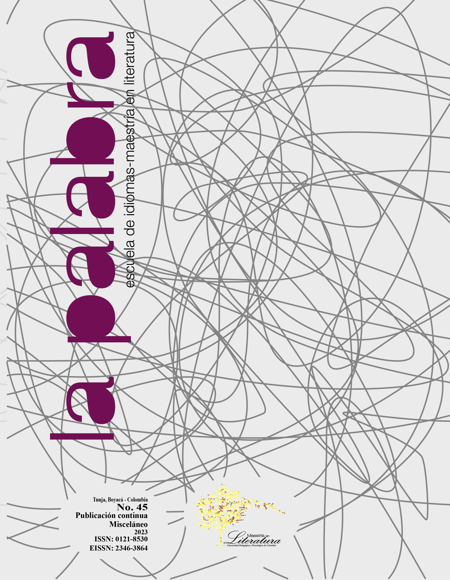Cognition and Estrangement in Two Recent Argentinian Novels

Abstract
We propose a study of cognition ways constructed from the category of estrangement in the science fiction novels V (2017), by Mariana Docampo, and El ojo y la flor (2019), by Claudia Aboaf. Marxism and Cultural Interpretation are taking into account through Fredric Jameson contributions. This approach focuses on read the relationship between subjective experiences and a fragmented and conflictive social totality that are suggested in the storytelling atmospheres. The reading of those novels is oriented around estrangement technique in both the enunciation and the plot. In any case, the novels aesthetic proposal exhibits the construction of an alternative epistemology which moves from the recognition of contradictions towards the configuration of unexpected associative networks.
Keywords
Argentine literature, Science fiction, estrangement, cognition, dialectics, Aboaf, Docampo
Author Biography
Lucía Feuillet
PhD and BA in Literature from the National University of Córdoba (Argentina). Postdoctoral fellow at CONICET and Assistant Professor of Literary Theory and Methodology I, School of Letters, Faculty of Philosophy and Humanities (UNC).
References
- Aboaf, Claudia. El ojo y la flor. Alfaguara, 2019. Impreso.
- Adorno, Theodor W. Introducción a la dialéctica. Traducido por Mariana Dimópulos. Eterna Cadencia, 2013. Impreso.
- Arnés, Laura, Lucía De Leone y María José Punte. En la intemperie. Poéticas de la fragilidad y la revuelta. Historia feminista de la Literatura Argentina. Vol. 5. Eduvim, 2020. Impreso.
- Cano, Luis C. Intermitente recurrencia. La ciencia ficción y el canon literario hispanoamericano. Corregidor, 2006. Impreso.
- Cox-Palmer-White, Emily. The Biopolitics of Gender in Science Fiction. Feminism and Female Machines. Routledge, 2021. Impreso. DOI: https://doi.org/10.4324/9780367691011
- Dellepiane, Ángela B. “Narrativa argentina de ciencia ficción. Tentativas liminares y desarrollo posterior”. IX Congreso de la Asociación Internacional de Hispanistas. Volumen II, Berlín, ago. 18-23. Berlín 1986 Berlín, Vervuert, 1989. 515-525. Web. 30 de julio de 2022. https://www.letrasgalegas.org/obra/narrativa-argentina-de-ciencia-ficcion-tentativas-liminares-y-desarrollo-posterior-/Docampo, Mariana. V. Bajo la luna, 2017. Impreso.
- Heffernan Jiménez, Julián. “Dialéctica”. Fredric Jameson: una poética de las formas sociales. Claves conceptuales. 1ed. Editado por Pampa Arán y Ariel Gómez Ponce. Centro de Estudios Avanzados, 2020. pp. 41-58. Impreso. Jameson, Fredric. “Cognitive Mapping” Marxism and the interpretation of culture. 1ed. Editado por Cary Nelson y Lawrence Grossberg. University of Illinois Press, 1988. pp.347-360. Impreso. DOI: https://doi.org/10.2307/j.ctv31vqpb7.7
- ---. Documentos de cultura, documentos de barbarie. Traducido por Tomás Segovia. Visor, 1989. Impreso.
- ---. Arqueologías del futuro. El deseo llamado utopía y otras aproximaciones de ciencia ficción. Traducido por Cristina Piña Aldao. Akal, 2009. Impreso.
- ---. Valencias de la dialéctica. Traducido por Mariano López Seoane. Eterna cadencia, 2013. Impreso.
- ---. Brecht y el método. Traducido por Teresa Arijón. Manantial, 2013. Impreso.
- ---. Marxismo y forma. Teorías dialécticas de la literatura en el siglo XX. Traducido por Cristina Piña Aldao. Akal, 2016. Impreso.
- ---. “Hacia una crítica dialéctica”. Fredric Jameson: una poética de las formas sociales. Claves conceptuales. 1ed. Editado por Pampa Arán y Ariel Gómez Ponce. Centro de Estudios Avanzados, 2020. pp. 13-18. Impreso.
- Kurlat Ares, Silvia G. “La ciencia ficción en América Latina: leyendo un panorama oculto”. La ciencia ficción en América Latina. Crítica. Teoría. Historia, editado por Silvia Kurlat Ares y Ezequiel de Rosso. Peter Lang, 2021. pp. 3-18. Impreso. DOI: https://doi.org/10.3726/b14351
- Lukács, György, Historia y conciencia de clase. Estudios de dialéctica marxista. Razón y Revolución, 2009. Impreso.
- Moylan, Tom, Scraps of the Untainted Sky. Science Fiction. Utopia. Dystopia. Westview, 2020. Impreso.
- Pérez Gras, María Laura. “Hasta que los astros se alineen. Espacios, cuerpos y tecnología en la trilogía de Claudia Aboaf”. Mitologías Hoy, núm. 22, 2020, pp. 175-190. Web. 30 de jul. de 22. https://doi.org/10.5565/rev/mitologias.747. DOI: https://doi.org/10.5565/rev/mitologias.747
- Shklovski, Víctor. “El arte como artificio”. Teoría de la literatura de los formalistas rusos. Compilado por Tzvetan Todorov. Traducido por Ana María Nethol. Siglo XXI, 2004. pp. 77-98. Impreso.
- Suvin, Darko Metamorfosis de la ciencia ficción. Sobre la poética y la historia de un género literario. Fondo de Cultura Económico, 1984. Impreso.
- ---. Defined by a Hollow. Essays on Utopia; Science Fiction and Political Epistemology. Peter Lang, 2010. Impreso.
- Russ, Joanna. To Write Like a Woman. Essays in Feminism and Science Fiction. Indiana University Press, 1995. Impreso.
- Vint, Sherryl. Science Fiction. The MIT Press, 2021. Impreso. DOI: https://doi.org/10.7551/mitpress/11841.001.0001
- Žižek, Slavoj. Visión de paralaje. Traducido por Marcos Mayer. Fondo de Cultura Económica, 2017. Impreso.
